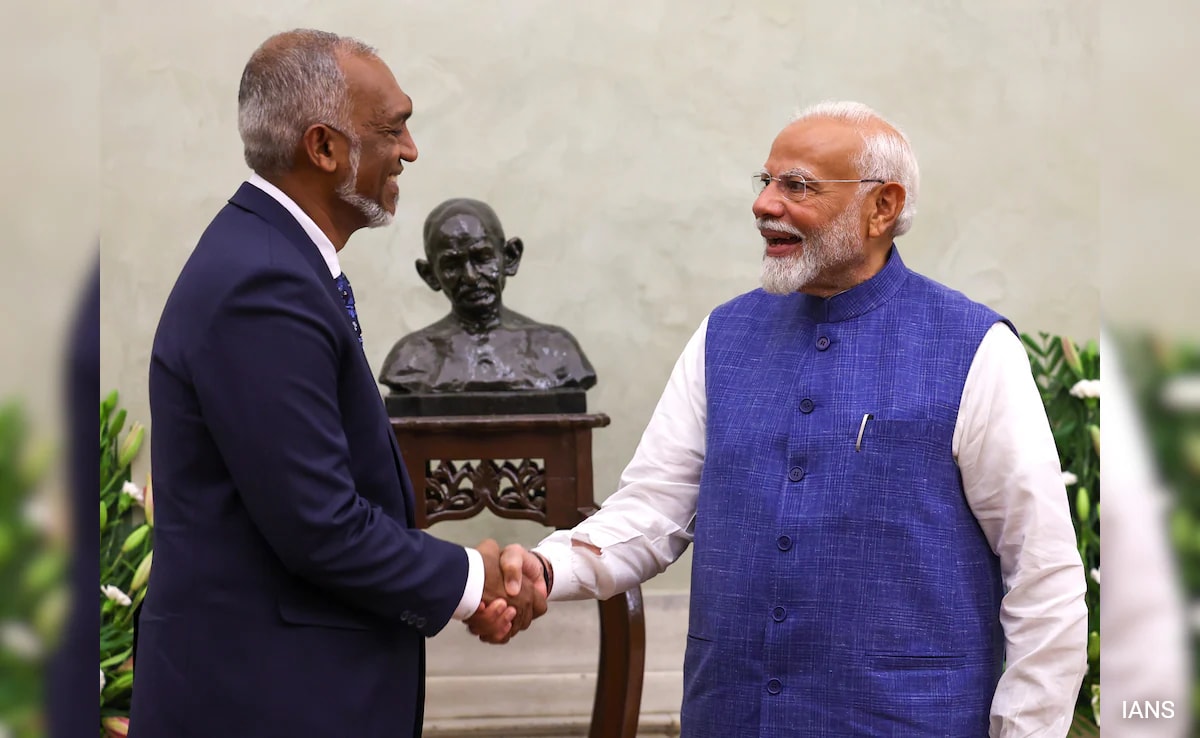Prime Minister Narendra Modi on Monday met Maldives President Mohamed Muizzu and underlined New Delhi’s position as a “close friend” of the island nation, emphasising his ‘neighbourhood first’ foreign policy that has seen India act as a ‘first responder’ to financial and medical emergencies affecting Male, including supplying its nearly six lakh people with Covid vaccines during the pandemic.
The Maldives, the Prime Minister also said, has an important role in ensuring the security of the Indian Ocean Region – an issue red-flagged by many within the Indian government after President Mohamed Muizzu – seen as a ‘pro-China leader – won last year’s election on an ‘India out’ platform.
“Be it essential commodities, vaccines during Covid, or drinking water… we have played a good neighbour,” he said, adding that India had also inaugurated an airport and handed over 700 social housing units, and plans to support construction of a new port. Referring to the drinking water project now operational on 28 Maldivian islands, he said over 30,000 people would now get clean water.
India and Maldives also discussed the opening of consulates in Addu and Bengaluru, the PM said.
Mr Modi’s comments came after he hosted Maldives President Mohamed Muizzu to a bilateral meet this afternoon; visuals of the two leaders clasping hands and smiling broadly – after a ceremonial welcome by President Droupadi Murmu at Raj Bhavan – were posted by news agency ANI and widely shared.
For his part Mr Muizzu once again pitched for the large-scale return of Indian tourists to the Maldives; tourism is the island nation’s biggest source of revenue and this took a hit last year after Indian tourists cancelled reservations to protest three Maldivian minister’s comment about the Prime Minister. The Maldives Foreign Ministry had distanced itself from the remarks.
The Maldivian leader said he also hopes to conclude a free trade agreement with India, with the aim of increasing investment in his country. The Indian government has already helped set up a substantial drinking water and sewerage facility in the Maldives – this was handed over by Foreign Minister S Jaishankar last month – and is also helping build road infrastructure.
Earlier today Mr Muizzu stressed his country would not act to undermine India’s security, and that it views New Delhi as a “valued partner and friend”. Cross-country cooperation in several fields – including defence – will “always be a priority”, he told a leading English daily.
“Maldives would never do anything to undermine security of India. While we enhance cooperation with other countries in various sectors, we remain committed to ensuring our actions do not compromise the security and stability of our region…” he told The Times of India in an extensive interview yesterday.
This is Mr Muizzu’s first bilateral visit and the comments reflect growing bonhomie after a months-long diplomatic stand-off last year, over three Maldivian ministers’ comments about Prime Minister Modi after a social media post about Lakshadweep as an alternate tourist destination to the Maldives.
And then the request in May – weeks before attending Mr Modi’s swearing-in ceremony – to remove 90 military personnel deployed to three aviation platforms gifted by India – also raised eyebrows.
Delhi accepted the request and replaced military personnel with “competent technical” staff.
The ejection of Indian military personnel and an ‘India Out’ agenda was seen as one of Mr Muizzu’s key poll promises. Pressed on these topics, the Maldives President said he “did what the people of Maldives asked of me”, but stressed India remains a key partner in efforts to secure regional stability. He denied that his government has an ‘India out’ agenda and said it was simply the case that “the people of Maldives do not want a foreign soldier in their country”.














